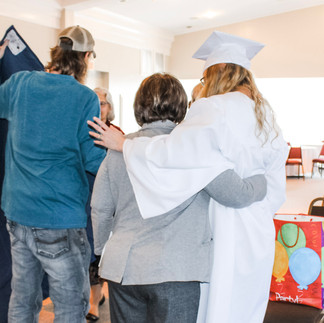A special moment: The rewards of a Hope Center graduation are life-changing
- Hope Center Indy
- Feb 10, 2022
- 3 min read
Updated: Jun 1, 2023
Of the many special moments that happen at Hope Center Indy, one of the most special comes when a woman completes her program of recovery and graduates.

“Our graduation ceremonies are so joyful! The best part is seeing the huge smile on the graduate’s face and seeing her be proud of herself,” Mary Nolen, the center’s associate director, said. “I love how we get to celebrate all of her accomplishments along the way, and each person who journeyed alongside her can affirm her hard work and share with her how she has inspired them.”

The path to recovery and healing is long and hard. And it requires courage, perseverance, and a deep commitment to working toward a better future, even when it seems so hopelessly far away.
The Hope Center’s mission is to help women overcome sex trafficking, exploitation in the commercial sex industry, and addictions. Misconceptions about trafficking and about commercial sexual exploitation abound. One of the biggest and most common is that victims of human trafficking have been kidnapped by strangers.
“While abductions do happen in rare occasions, the top two ways that researchers have found that traffickers recruit their victims in the U.S. is through an intimate partner relationship -- often called a “Romeo pimp” -- and through familial relationships,” Nolen said. “This means that the trafficking survivor has most likely been betrayed by a boyfriend whom she loved and thought that he loved her back, or she has experienced deep betrayal by someone in her family -- possibly even her parents -- who she should have been able to trust.
The emotional damage from such a devastating betrayal of trust can last for years, even a lifetime, without intervention, support, forgiveness, and healing. And in many cases, commercial sexual exploitation is not the first trauma that trafficking victims have suffered.
“Because of my experience as a foster mom, my heart is drawn to the fact that a high percentage of trafficking survivors spent time in the foster care system as children,” Nolen said. “Researchers say that around 60% of trafficking victims spent time in foster care as a child. This indicates that many survivors faced abuse, neglect, abandonment, and may have been forced to witness or participate in substance abuse as young children.”
The Hope Center offers three residential programs for women who are working to overcome exploitation and addictions. Each program offers residents a path toward emotional and spiritual healing, forging new patterns of thinking and decision-making, and building healthy relationships.
Nolen was asked what she would want someone unfamiliar with the Hope Center’s work to understand about the ministry.
“I would want them to know that sex trafficking is a growing evil in our nation, and we need an army of people to step up to fight against it,” she said. “We should each feel accountable to stand up for those who are being oppressed. It’s estimated that there are 300,000 victims of sex trafficking in the U.S. For those 300,000, there are only about 1,300 beds in shelters across the U.S. This is why every shelter is important, and why we want to continue to grow and develop our ministry. Every survivor deserves the opportunity to have support to rebuild her life, and we are honored to work every day to provide those opportunities for survivors.”
To learn more about how you can support women who are breaking free of commercial sexual exploitation, visit hopecenterindy.org/getinvolved.












Comments